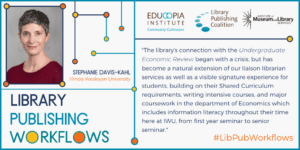Editor’s note: This is a guest post in our Library Publishing Workflow Evolution series, featuring reflections from our Library Publishing Workflows partners on how journal publishing workflows at their libraries have evolved over time. You can see the full documentation on the Library Publishing Workflows page.
By Stephanie Davis-Kahl, writing about her experiences at Ames Library at Illinois Wesleyan University
It all started with a catastrophic server meltdown in the fall of 2008 that erased IWU from the web.
Most of our student journals, which had resided on our website, disappeared. The sites, the pdfs, images – all gone. After everything came back up (in a matter of hours), many files were corrupted or had just simply vanished into the ether.
The library had just implemented Digital Commons software from bepress, and we had started digitizing the print journals already, however, there was one born-digital journal that was a near-total loss, the Undergraduate Economic Review (UER). The faculty advisor for the UER, Robert S. Eckley Distinguished Professor of Economics Micheal Seeborg, had attended one of our presentations about Digital Commons and reached out to the library to see if we could help save the journal, first of all, and second, if we could use the journal publishing software in Digital Commons to streamline the editorial process. The answer to both, of course, was yes.
Flash forward thirteen years later, and the UER is still going strong: our student editors continue to do stellar work to review articles, the journal has robust, worldwide download statistics, and we regularly receive submissions from undergraduate researchers in economics from around the world.
UER Roles & Responsibilities
The UER is run by students majoring in Economics at IWU, and the UER is open to any and all undergraduate researchers. A student is selected and compensated for taking on for editor-in-chief responsibilities, and leads the peer reviewers, made up of students who have taken the requisite econometrics and writing courses in the major.

Professor Seeborg has been the faculty advisor since the journal began in 2005, and has mentored many undergraduate research students at IWU. The journal has persevered in large part due to his advocacy, passion for undergraduate research, and belief in open access. An indication and testament to his dedication is the fact that he retired a few years ago, but continues to teach our senior seminar and advise the journal, and as the faculty managing editor of the journal, I couldn’t be more grateful for his continued involvement.
The work begins at the start of the academic year, when the new editor in chief, senior seminar and other interested students, and Professor Seeborg meet with me to get an overview of the purpose of the UER, how they will evaluate articles using a set of criteria developed over time, how to work in the Digital Commons software, and how to provide professional feedback to authors. Professor Seeborg works with the students to norm the evaluative criteria by using past published submissions, and the editor in chief then assigns students their first article to review. Professor Seeborg and I are on hand throughout the rest of the academic year to answer questions about submissions or about Digital Commons, but our editor in chief and student peer reviewers do all the editorial work of reviewing and recommending articles for publication. The issue is closed in late April or May, and if submissions come in the summer, I communicate with authors to let them know when our review cycle will restart. A new editor is appointed by the faculty in the department in late spring or over the summer, and they come into the journal with experience reviewing articles as a sophomore or junior, so they are well-versed in the journal’s purpose from the outset.
Library’s Role
The library’s connection with the UER began with a crisis, but has become a natural extension of our liaison librarian services as well as a visible signature experience for students, building on their Shared Curriculum requirements, writing intensive courses, and major coursework in the department of Economics which includes information literacy throughout their time here at IWU, from first year seminar to senior seminar. The fact that the journal is born-digital, peer reviewed, and intentionally open access from its inception is a testament to the students’ continued dedication to the journal over time; they understand and accept the responsibility to use their disciplinary knowledge of economics, economics research, econometrics, and writing to improve and share the work of their worldwide peers. It has been a privilege to work alongside both Professor Seeborg and the students on the Undergraduate Economic Review, and I look forward to reading the journal for years to come.
